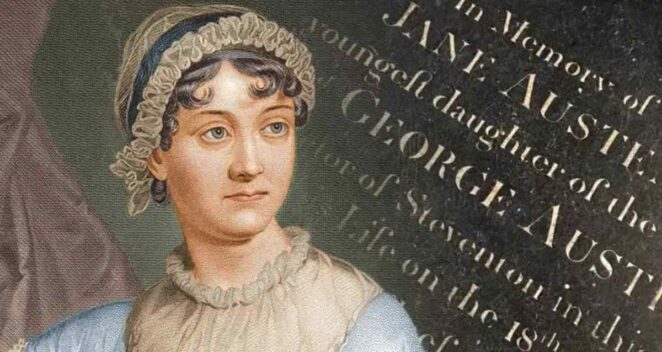The first great female novelist in literary history: Who is Jane Austen?
Jane Austen, who signed all her novels published throughout her life anonymously, was understood to be the author of these novels only after her death. Today, her books are sold in the millions.

A fan group called "Janeites" comes together to commemorate Austen's works and the spirit of her time through events such as balls, readings, and trips.
Jane Austen is the most well-known and most adapted writer after Shakespeare. Although she is indeed the first great female novelist and one of the most well-known names in the history of literature, strangely enough, what we know about Austen's life is quite limited.
Jane Austen (16 December 1775 – 18 July 1817) was an English novelist known primarily for her six novels, which implicitly interpret, critique, and comment upon the British landed gentry at the end of the 18th century. Austen's plots often explore the dependence of women on marriage for the pursuit of favourable social standing and economic security. Her works are an implicit critique of the novels of sensibility of the second half of the 18th century and are part of the transition to 19th-century literary realism. Her deft use of social commentary, realism and biting irony have earned her acclaim among critics and scholars.
Born in 1775 in Steventon, a small town in England, Austen spent most of her life, with short exceptions, in rural areas of England. The author, one of the two daughters of a large family, used both her family and the region as the subject of her novels, which she started writing at a young age. After the death of her father, she experienced financial difficulties with her mother and sister. She was able to publish her works only after moving to a small country house in the town of Chawton with the help of her brother - also due to financial needs. The author, who fit many novels and stories into her short literary career, passed away in 1817 due to an illness that some diagnosed as Addison's disease, others as cancer, and others as arsenic poisoning. Austen, whose grave is in Winchester Cathedral, gained great fame, especially during the Victorian Era, and became one of the most famous writers of world literature.
A world where “every well-off single man needs a wife”…
In one of her letters, Austen describes herself as "who knows no other language than her mother tongue, who has read very few works in that language," who "has been deprived of classical education," and who, at best, is "the most ignorant, most ignorant woman in the world who has dared to write" (Letters of Jane Austen Vol.2, page 349). However, contrary to this modest approach, in order to prove herself in the world of literature, where she "daringly" steps into it, she resorts to the only thing she has, that is, her own life and observations, as every female writer does.
In fact, Austen is so committed to this view of "writing what you know" that she does not examine almost any other social class or lifestyle at the center of her works, other than the ordinary life of the middle and upper-middle classes living in rural areas of England.
Marriage, the most fundamental institution of this society of which Austen was a part, was a union in which financial security and social status were the most important criteria for women and reputation for men. We can also say that these criteria are the basic elements that determine the actions of the Austen characters and their relations with each other.
Although Austen's novels proceed through romantic relationships between the main characters, the institution of marriage appears as the ultimate control mechanism over these relationships. Since the assets of a family, that is, the inheritance in question, are transferred through the sons, marriage is, in a sense, the only way for the daughters of that family to secure their lives. (Of course, the annual income of men in thousands of pounds is as important as the reputation of women.) At this point, we should take a closer look at the theme of love, which is the main subject of Austen's novels and is shaped within the framework of the institution of marriage.
What are we actually talking about when we talk about love in Austen's novels?
Although the love presented in Austen's novels seems to have a passionate nature due to the general perception created by cinema adaptations - one of the biggest responsible for this is BBC's adaptation of Pride and Prejudice in 1995 - the situation is not quite as we think.
Austen, whose love life we do not know much about, other than the fact that she had a romantic relationship with an Irish young man named Tom Lefroy in her youth, that she first accepted a marriage proposal from Harris Bigg-Wither in 1802 and rejected it the next morning, and that, unlike the main characters, she did not marry throughout her life. , always handles the theme of love in her works within the limits of common sense and moderation that society encourages.
In Sense And Sensibility, which she first wrote in letter format and then rewrote from scratch because she was not satisfied with it, Austen says that sense is "the foundation on which every good thing can be built." While Marianne, who ignores this idea for most of the novel, suffers heartbreak for the excess of her feelings for Willoughby, Elinor is rewarded with her marriage to Edward as a result of her cautious approach.
The male heroes in the foreground in Austen's novels do not resemble Emily Brontë's hero Heathcliff (Wuthering Heights) or Charlotte Brontë's hero Rochester (Jane Eyre), and they do not contain feelings such as passion and anger.
Long story short, in Austen's novels, a romantic relationship that lacks manners and decorum never ends well, while common sense and decorum are always rewarded.
